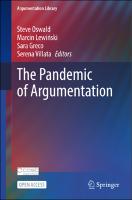The Pandemic of Argumentation
Contributor(s)
Oswald, Steve (editor)
Lewiński, Marcin (editor)
Greco, Sara (editor)
Villata, Serena (editor)
Language
EnglishAbstract
This open access book addresses communicative aspects of the current COVID-19 pandemic as well as the epidemic of misinformation from the perspective of argumentation theory. Argumentation theory is uniquely placed to understand and account for the challenges of public reason as expressed through argumentative discourse. The book thus focuses on the extent to which the forms, norms and functions of public argumentation have changed in the face of the COVID-19 pandemic. This question is investigated along the three main research lines of the COST Action project CA 17132: European network for Argumentation and Public PoLicY analysis (APPLY): descriptive, normative, and prescriptive. The volume offers a broad range of contributions which treat argumentative phenomena that are directly related to the changes in public discourse in the wake of the outburst of COVID-19. The volume additionally places particular emphasis on expert argumentation, given (i) the importance expert discourse has had over the last two years, and (ii) the challenges that expert argumentation has faced in the public sphere as a result of scientific uncertainty and widespread misinformation. Contributions are divided into three groups, which (i) examine various features and aspects of public and institutional discourse about the COVID-19 pandemic, (ii) scrutinize the way health policies have been discussed, debated, attacked and defended in the public sphere, and (iii) consider a range of proposals meant to improve the quality of public discourse, and public deliberation in particular, in such a way that concrete proposals for argumentative literacy will be brought to light. Overall, this volume constitutes a timely inquiry into all things argumentative in pandemic discourse. This volume is of interest to a broad readership including philosophers, linguists, communication and legal scholars, and members of the wider public who seek to better understand the discourse surrounding communicative phenomena in times of crisis. COST (European Cooperation in Science and Technology) is a funding organisation for research and innovation networks. For more information: www.cost.eu
Keywords
Argument Propagation; Fake News Propagation; Argumentation Covid; Misinformation Pandemic; Conspiracy Theory Covid; Argumentative Literacy; Public Debate; Trust/Mistrust in Science; Public Health Discourse; Political Interference and Argumentative Styles; Metalinguistic Arguments on What Counts As “Covid-19 Death”; Evaluative Component in Pragmatic Argumentation; public Discourse First Wave Sars-Cov-2 Pandemic in Italy; Controversies and Dispute in France During the Covid-19 Crisis; Analysing the Public Debate About Lockdown; Responding to the COVID Conspiracy Theories; Why Narratives are More Powerful Arguments than Fact-Checking; Expanded Understanding of the Role of Analogy; Argumentative Dark Side of Pandemic Discourse; Open AccessDOI
10.1007/978-3-030-91017-4ISBN
9783030910174, 9783030910174Publisher
Springer NaturePublisher website
https://www.springernature.com/gp/products/booksPublication date and place
Cham, 2022Imprint
SpringerSeries
Argumentation Library, 43Classification
Philosophy of language
Linguistics
Society and Social Sciences
Media studies


 Download
Download Web Shop
Web Shop